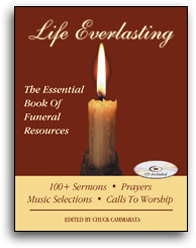SermonStudio
Where To Go When You Grieve
Sermon
Life Everlasting
The Essential Book of Funeral Resources
For a forty-year-old
Where To Go When You Grieve
Matthew 14:12
(This funeral sermon was preached for a forty-year-old member of my congregation; he died after an illness of six weeks, leaving a wife and two teenaged daughters.)
Where To Go When You Grieve
Matthew 14:12
(This funeral sermon was preached for a forty-year-old member of my congregation; he died after an illness of six weeks, leaving a wife and two teenaged daughters.)


